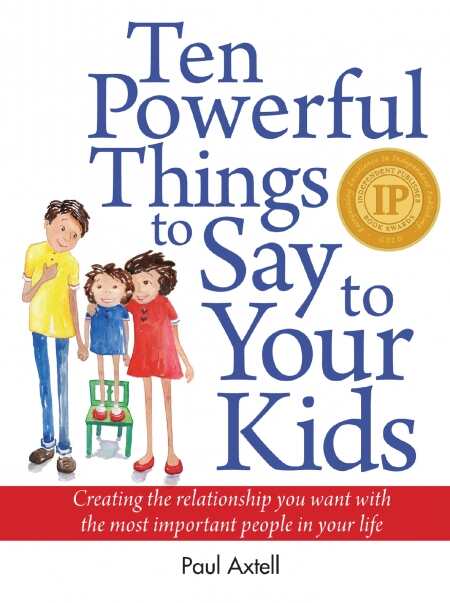Ten Powerful Things to Say to Your Kids
Creating the Relationship You Want with the Most Important People in Your Life
- 2011 INDIES Winner
- Honorable Mention, Parenting (Adult Nonfiction)
Parents struggle endlessly to maintain positive, effective relationships with their children. This book’s insights come in bite-size nuggets that will stay with readers for far longer than the fleeting time it will take to read, but they contain potent tools for improving relationships with children of every age.
Words create reality, and their immense power needs to be wielded carefully. Even a protective statement, such as “she’s shy,” can resonate for decades; and the result might be an adult who hesitates to speak at board meetings. Author Paul Axtell, who mines decades of experience as an interpersonal relations expert in the business sector, also cautions against positive labels such as “smart,” “athletic,” or “beautiful.” Describing accomplishments as inherent qualities can backfire when a child encounters frustration or failure. Encouragement of the learning process, Axtell argues, is far more effective over time.
“People don’t just come into the world equipped with good conversational skills,” Axtell writes, asking readers to reflect on messages they heard as children. If they recall childhood as a constant barrage of criticism and “no” statements, they can choose to write new scripts for their own children based on what they wish they had heard.
Inspiration also appears in the form of quotes that highlight Axtell’s simple precepts, reinforcing the profundity of his advice. For example, Aldous Huxley’s cynical comment that “most human beings have an almost infinite capacity for taking things for granted” contrasts with Goethe’s sage advice for parents of adolescents: “If you treat an individual as he could be, he will become the person he could be.” Undone chores and assignments are recast here as teachable moments in which an expression of faith in the child’s capability for learning can elicit the desire to improve.
Rather than rules and punishments, Axtell recommends “agreements,” some as simple as “Be nice” or “Do the right thing.” For older kids, respect matters: “I’m going to trust you…I just request that you think about what the rest of the family needs to know in order not to worry or be upset.”
Axtell urges parents to take heart despite past blunders. Today’s praise can mitigate yesterday’s criticism, especially when accompanied by an apology for harsh words. New speech from adults can change their conversations with their children; as Woodrow Wilson’s said, children need “light, not heat,” to thrive. Finally, parents should recall that even Michael Jordan attributes his success to missing “more than 9,000 shots” and losing “over 300 games” during his career. Children, like baskets: they welcome our “slam-dunks” with open arms, but are forgiving enough to allow do-overs.
Reviewed by
Elizabeth Breau
Disclosure: This article is not an endorsement, but a review. The publisher of this book provided free copies of the book and paid a small fee to have their book reviewed by a professional reviewer. Foreword Reviews and Clarion Reviews make no guarantee that the publisher will receive a positive review. Foreword Magazine, Inc. is disclosing this in accordance with the Federal Trade Commission’s 16 CFR, Part 255.

